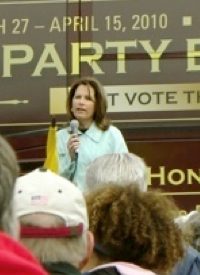
Republican Representative Michelle Bachmann of Minnesota announced in July that she would be forming a Tea Party Caucus. With the creation of the constitutional conservative caucus, Bachmann also indicated that she would implement a program that teaches the Constitution to those elected to office. This week, Bachmann revealed that Supreme Court Associate Justice Antonin Scalia will lead the first of the constitutional seminars for members of Congress in late January.
Yahoo News writes, “The event is officially for members of Bachmann’s Constitutional Conservative Caucus, but the Tea Party favorite hopes ‘all the members of Congress’ will attend. She also wants to line up Justice Samuel Alito and Chief Justice John Roberts for future sessions.”
Bachmann explains, “Justice Scalia has graciously agreed to kick off our class the hour before we cast our first vote in Congress. We’ll meet in the Capitol; we’ll have a seminar on a segment of the Constitution … that’ll set the tone for the week we’re in Washington.”
She adds, “It’s bi-partisan.”
The Blaze reports, “Bachmann spokesman Doug Sachtelben says the education series is a response to conservatives’ calls for a return to constitutional principles in governing.”
Sachtelben adds that the bi-monthly seminars will “bring up principles that are familiar to the members,” including the Bill of Rights and constitutional role of the government.
During an interview with radio host Lou Dobbs, Bachmann compared the constitutional seminars to athletic practices in which professional baseball and football players engage:
We’re going to practice every week, if you will, our craft, which is studying and learning the Declaration, the Constitution, and the Bill of Rights. We’ll have a speaker, we’ll have questions and answers, we’ll wrap our minds around this magnificent document.
Why Justice Scalia?
Bachmann states, “Justice Scalia has distinguished himself by his ‘originalist’ approach to constitutional interpretation.”
Bloomberg News reports that the announcement that Scalia will address the caucus “evoked mixed reactions from experts on judicial ethics.”
Remarking on Justice Scalia’s role in the Constitution Seminar, however, Jennifer Epstein at Politico explains that while it is “unusual” for a Supreme Court Justice to meet with lawmakers, it is not “unprecedented.”
Similarly, Ronald Rotunda, legal ethics professor at Chapman University School of Law in Orange, California contends that Scalia’s appearance is not an issue.
“Justices are allowed to give speeches on the law and legal reform.”
Steven Lubet of Northwestern University School of Law also does not “see any issues” in Scalia’s decision to speak to the Caucus.
The Huffington Post reports, “Beyond Supreme Court Justices, Bachmann has also supposedly made plans to court a variety of other conservative stars, such as…. Judge Andrew Napolitano, Fox News personality Sean Hannity, and … David Barton,” a regular guest on the Glenn Beck program.
In addition to Bachmann’s efforts to maintain Constitutional Conservative values, Kentucky’s Republican Senator-elect Rand Paul has asserted a desire to form a bicameral Tea Party caucus. Paul asserts that the Tea Party caucus will help to ensure the preservation of Tea Party ideals:
Americans don’t understand why we have to balance our own family budget and Congress doesn’t. It just doesn’t make any sense to us. We have to do something to get our fiscal house in order.
Similarly, Bachmann told USA Today that the purpose of the caucus is to focus on constitutional issues, such as those emphasized by voters in the midterm elections: lower taxes and smaller government.
When she announced her plans to form the Tea Party Caucus, Bachmann said, “Congress should act within the constitutional limitations as given to us by the founding fathers.”
The Caucus currently has 52 members, all of whom are Republicans. The group is expected to increase to 80 members when the newly elected congressmen take office in January.




